By Lambert Strether of Corrente.
Patient readers, I had intended to use the New Year’s break to revise the Water Cooler template, incorporating many of your helpful suggestions for improvement. But “If you want to make the Gods laugh, tell Them your plans!” The revisions are coming, I promise. –lambert
And also patient readers, I took a call from a sick friend in the middle of writing, so orts and scraps will be ortier and scrappier –lambert
Bird Song of the Day
Mourning Dove, Finger Lakes NF–Horton Pasture and Interloken Trail, Seneca, New York, United States.
Politics
“So many of the social reactions that strike us as psychological are in fact a rational management of symbolic capital.” –Pierre Bourdieu, Classification Struggles
The Constitutional Order
“Axelrod says he thinks it ‘would rip the country apart’ if Trump were prevented from running” [The Hill]. “Former Obama adviser David Axelrod warned Friday that a court decision removing former President Trump from the primary ballot “would rip the country apart” as legal questions mount over his candidate qualification… ‘I have very, very strong reservations about all of this,’ Axelrod said in an ‘Erin Burnett OutFront’ interview on CNN. ‘I do think it would rip the country apart if he were actually prevented from running because tens of millions of people want to vote for him.'”… ‘We’ve run this experiment, he’s only gained since he started getting indicted,’ [Axelrod] continued. ‘What you thought might be kryptonite for him has turned out to be battery packs, and this is a big one for him.'” • Presumably, Axelrod is
The Mouth of Sauronspeaking for The Wizard of Kalorama™, who presumbly has an alternative to Biden in mind. But how?“Will Trump’s disqualification case be Bush v. Gore for 2024?” [The Hill]. “The flap all started with an influential August 2023 law review article coauthored by conservative constitutional scholars William Baude and Michael Stokes Paulsen, which analyzed every bit of the history, structure, text and original understanding of Section 3 — and concluded that Trump was disqualified.” Already the Democrats are rewriting history; the “flap” began immediately after Biden’s inaugural, as I show here. More: “The justices might find that there is insufficient evidence that Trump ‘engaged in an insurrection,’ but to do this they would have to deny the Colorado findings as well as incontestable facts — based largely on Trump’s statements, tweets and conduct — that are generally accepted by a majority of the American public. We all witnessed it in real time.” • Ah, so that’s the liberal Democrat conception of due process. Good to know.
2024
Less than a year to go!
* * * “The Year We Stopped Being Able to Pretend About Trump” [Susan Glasser, The New Yorker]. Not “the royal ‘we’,” the PMC “we.” “But the past few years of Trump, Trump, Trump have taught me, if nothing else, that hoping for the best is not necessarily a winning strategy. With American democracy on the line, I’m taking the only defensible position toward the New Year: full-scale dread. I plan to pull up the covers and hide under my pillow as long as possible come January. It’s going to be a long twelve months.” • 2024 – 2016 = 8 years of daily hysteria, and only now they stop “pretending”? RussiaGate was pretending?
“Trump’s courtroom and campaign trail collision is about to become a reality” [CNN]. “Trump’s double political and legal life in the next few weeks will coincide with the intensifying effort by his Republican rivals to thwart his march toward a third consecutive Republican nomination…. Any Iowa victory party on January 15 could, meanwhile, be soured for Trump the next day with the opening of the trial to set damages in the second lawsuit brought against him by E. Jean Carroll…. The outcome of the appeals court action on Trump’s immunity claim will be especially important in establishing whether the current start date for his federal election interference trial will slip past March 4 – which is the day before Super Tuesday. That could then reshuffle the schedules of the other judges and will help determine whether Trump will actually face a criminal trial before November’s election.”
“The GOP’s most Trump-skeptical bloc starts falling in line” [Politico]. “Donald Trump is making serious headway with a bloc of the GOP that’s among the most skeptical of his 2024 bid: Republican senators. In some cases, Trump is breaking through thanks to the sort of personal attention that he’s known to lavish on allies and supporters. … Trump’s campaign for Capitol endorsements is accelerating as he nears the first GOP nominating contest in Iowa. He won five endorsements from Republican senators during December alone, after snagging just three of them over the preceding four months. So far, Trump’s secured 18 endorsements from the Senate GOP, a group that ranges from establishment-minded Republicans to confrontational conservatives who will be vocal allies if he wins another term. That success winning over the Hill GOP was hardly guaranteed — and comes just three years after Trump mounted a public campaign to overturn his 2020 loss that’s gotten him indicted on dozens of criminal charges. But a combination of behind-the-scenes courtships like that of Hoeven and the growing feeling of inevitability that Trump will win the nomination is peeling off Republican senators who might otherwise have longed for a new, less divisive standard-bearer. These days, many in the GOP see only upside to early support for Trump.”
“Steve Bannon Says ‘Big Fight’ Will Soon Take Place Over Direction of Trump Campaign: ‘They’re Gonna Try To Force Nikki on the Ticket'” [Mediaite]. Bannon: “They’re gonna try to force Nikki on the ticket. They’ll say Trump needs a woman, Nikki on the ticket, she balances things and she can bring together that 15% of Never Trumpers in the Republican party. We’re going to have to have that fight. If Nikki Haley is in this administration in any capacity, it will fail. She’s a viper. She’s a viper and once she gets in there, she’ll try to run it as prime minister. She’ll try to be Dick Cheney. Her to Trump will be just like Dick Cheney to Bush. That’s what she’ll try to do.”
“How Trump family Christmas photo reveals Barron is set for new public role: source” [New York Post]. “Barron Trump’s appearance in a family Christmas photo proves that Melania and former President Donald Trump are in ‘lockstep with one another,’ according to a well-placed source. The rarely seen 17-year-old posed for a holiday snapshot with his father, three of his siblings and other members of his extended family while his mom, Melania, was missing because she is caring for her sick mother, Amalija. But Barron’s appearance is ‘truly monumental,’ according to Melania’s former senior aide, Stephanie Winston Wolkoff, who told The Post we can expect to see more of the teen. Barron has deliberately been kept out of the spotlight by his ‘strategic’ mother, but was front and center in the photo posted by Kimberly Guilfoyle, Donald Trump Jr.’s fiancée, from Mar-a-Lago. Sources said Guilfoyle would never have posted the photo without • Hmm.
* * * “Seizure of Trump’s smartphone data puts special counsel in uncharted legal waters” [Washington Times]. “In court filings, Mr. Smith said a person identified as ‘Expert 3’ extracted and processed data from the White House cellphones of Mr. Trump and someone identified as ‘Individual 1.’ Individual 1 is believed to be former New York Mayor Rudolph W. Giuliani, who served as Mr. Trump‘s lawyer during the time. A spokesperson for Mr. Giuliani did not respond to a request for comment. The filing also says that Expert 3 ‘reviewed and analyzed data on the defendant’s phone and on Individual 1’s phone, including analyzing images found on the phones and websites visited.’ Earlier last year, it was revealed that Mr. Smith‘s team obtained location data and draft tweets from the president after a legal battle with Twitter, now known as X. The company attempted to block the prosecutor’s effort. The social media giant ultimately lost the court battle and handed over an extensive list of data related to Mr. Trump‘s account, including all tweets ‘crafted, drafted, favorited/liked or retweeted.'”
* * * “A fraying coalition: Black, Hispanic, young voters abandon Biden as election year begins” [USA Today]. “President Joe Biden heads into the election year showing alarming weakness among stalwarts of the Democratic base, with Donald Trump leading among Hispanic voters and young people. One in 5 Black voters now say they’ll support a third-party candidate in November. In a new USA TODAY/Suffolk University Poll, Biden’s failure to consolidate support in key parts of the coalition that elected him in 2020 has left him narrowly trailing Trump, the likely Republican nominee, 39%-37%; 17% support an unnamed third-party candidate…. Biden now claims the support of just 63% of Black voters, a precipitous decline from the 87% he carried in 2020, according to the Roper Center. He trails among Hispanic voters by 5 percentage points, 39%-34%; in 2020 he had swamped Trump among that demographic group 2 to 1, 65%-32%.”
“How the Biden campaign hopes to make 2024 less about Biden and more about a contrast with Trump” [CNN]. “Though multiple people involved tell CNN that many campaign operations remain bottlenecked, in the White House and in Wilmington, aides insist that interlocking plans have been taking shape for months. They push back on top donors, who griped to aides gathered at a pricey DC hotel in mid-December that the campaign does not seem to have a strategy beyond waiting to respond to Trump – and that it does not have a strategy at all if another candidate grabs the nomination. And they dismiss the many advocates and members of Congress who say they cannot pinpoint specifics about Biden’s agenda for a second term…. If Trump does become the Republican nominee, Biden aides say they will capitalize on the unique situation of a former president trying to return to the White House by putting the spotlight on parts of his record they believe voters find repulsive, as well as on promises he failed to deliver on in office. The word ‘receipts’ comes up a lot.” • I’ve got a receipt. It’s $600 short of what I thought it would be.
“‘They’ve written him off’: can Joe Biden beat Donald Trump again?” [Financial Times]. “Charlie Cook, a veteran non-partisan political analyst, said there were unnerving signs for Democrats that voters have soured on Biden for good, with little that the White House or the campaign will be able to do to shift sentiment. Biden’s approval ratings have been stubbornly negative for more than two years, since the late summer of 2021, Cook emphasised. ‘There seems to be virtually no elasticity there,’ he said. ‘I wonder whether people have just changed the channel — they’ve just written him off.’…. While many Democrats like to compare the 2024 election to 2012, when Barack Obama overcame a polling slump to win re-election, Cook warns that the 1968 and 1980 races offer better comparisons. Republicans won back the White House in both. ‘The mood is as sour as it was in 1980. And the country is even more divided than it was in 68,’ he said. ‘[Biden] has done enough to have a really outstanding legacy. But will his legacy be handing the White House back over to Donald Trump?'” • Hmm.
* * * “Republicans’ Narrow Control of House Sets Up Barnburner in 2024” [Wall Street Journal]. “David Wasserman, U.S. House editor for the nonpartisan Cook Political Report, said the House election is of the most suspenseful ones he has seen at his point in the race, partly because the influence of the 2024 presidential race remains unclear…. With such a small split, every race is important. …. If Democrats emerge with control, they will have pulled off a rare win: The House hasn’t flipped during a presidential election year since 1952. Their targets include 18 GOP-held districts, mostly located in New York and California, that Biden won in 2020…. Cook Political’s current analysis shows that Republicans have stronger odds to keep the majority, and Democrats would need to win two of every three of the seats ranked as tossups to take the majority. Still, Wasserman said that scenario isn’t a stretch: In 2022, Democrats won three in every four tossup seats.” • Handy map:
“These Voters Will Decide the 2024 Election. They Don’t Like What They See.” [Wall Street Journal]. “Michigan’s Saginaw County, Pennsylvania’s Northampton County and New Hampshire’s Hillsborough County are three of just 25 U.S. counties that have backed the presidential winner in each of the past four elections, making them rare enclaves of partisan flexibility in a country where most places are firmly red or blue. They are among the seven such counties that sit inside hotly contested battleground states that will decide who wins the White House this year, places where the victor can hinge on a few hundred votes. Collectively, Americans in the 25 counties that have swung with the electorate on average have lower median incomes and lower levels of education than the U.S. on the whole, census data show. They are older, more likely to be white and disproportionately live in smaller cities and rural areas. A greater share are age 65 or over and draw retirement income as compared with the total U.S. Nearly half of these counties have seen their populations shrink in recent years. What most of these counties have in common is they are largely removed from America’s major economic and cultural power centers.” • Handy map:
* * * “An Almanac Publisher’s 2024 Prediction: ‘Tumultuous'” [New York Times]. “I ended 2023 the way I had ended 2022, with a call to the publishers of the ‘Pocket Chinese Almanac.’ A year ago, they saw hope. Not this time. ‘We looked at this year’s predictions, and we got alarmed,’ said Joanna Lee, who with her husband, Ken Smith, has published the little book annually since 2010. ‘This is going to be a tumultuous year.’ Smith and Lee call themselves publishers, translators and annotators — not authors — because the predictions in the ‘Pocket Chinese Almanac’ are from Warwick Wong, a geomancer in Hong Kong. In late 2019, months before the first coronavirus case was recorded in New York, Wong told the couple, ‘Find a safe place to hide — there’ll be a disaster.’ He did not specify what the disaster would be. He himself disappeared to a monastery, Lee said…. Wong’s calculations — which leads to a set of Chinese characters that amount to a horoscope — had revealed a lopsidedness to this year of the dragon: ‘All of the characters are yang,’ Lee said. ‘There’s no yin.’ Smith added, ‘This is not in balance, shall we say.’ Smith said yang is ‘the predominant male trait.’ ‘People will be inflexible,’ he said. Lee added: ‘Nobody’s going to listen. Everybody’s going to be stubborn.'” • So I guess neither Oprah nor Michelle will be running, then.
Democrats en Déshabillé
Patient readers, it seems that people are actually reading the back-dated post! But I have not updated it, and there are many updates. So I will have to do that. –lambert
I have moved my standing remarks on the Democrat Party (“the Democrat Party is a rotting corpse that can’t bury itself”) to a separate, back-dated post, to which I will periodically add material, summarizing the addition here in a “live” Water Cooler. (Hopefully, some Bourdieu.) It turns out that defining the Democrat Party is, in fact, a hard problem. I do think the paragraph that follows is on point all the way back to 2016, if not before:
d>. (“PMC” modulo “class expatriates,” of course.) Second, all the working parts of the Party reinforce each other. Leave aside characterizing the relationships between elements of the Party (ka-ching, but not entirely) those elements comprise a network — a Flex Net? An iron octagon? — of funders, vendors, apparatchiks, electeds, NGOs, and miscellaneous mercenaries, with assets in the press and the intelligence community.
Note, of course, that the class power of the PMC both expresses and is limited by other classes; oligarchs and American gentry (see ‘industrial model’ of Ferguson, Jorgensen, and Jie) and the working class spring to mind. Suck up, kick down.
Why, it’s as if the legislative branch were a ginormous insider trading scheme:
🚨BREAKING🚨
I have just released the full report on politicians trading in 2023.
Like every year since 2020, US politicians beat the market.
And many in Congress made unusually timed trades resulting in huge gains.
Here are the top performers of 2023. pic.twitter.com/ykf9VICsBw
— unusual_whales (@unusual_whales) January 2, 2024
Grifters gotta grift:

From the data in the letter, this is an NGO money pit that collectively has accomplished exactly nothing (“fighting for”). And why the heck are NGOs even doing this? Wouldn’t a functional party take on such tasks?
What Sanders might have tweeted:
Alt: I have tested positive for covid, a preventable illness that in the last six weeks has hospitalized 137,000 Americans and killed 7,500. We must continue to fight against needless illness and death — starting with paid sick leave for all and free vaccines, treatment and care. https://t.co/FzJkReEJad
— wsbgnl (@wsbgnl) December 29, 2023
Much improved, but what about ventilation? Does he want other people in his home to catch what he’s got?
More on Obama speechwriter and now podcaster Jon Favreau’s “brand of person” tweet:
Amazing get out the vote campaign happening lol https://t.co/vbRcIrQHJD
— Chanda Prescod-Weinstein (@IBJIYONGI) December 31, 2023
And more:
Imagine receiving thousands of thoughtful and measured comments patiently explaining why your comment was problematic and instead doubling down and finding and platforming the one other dude who’s busy trying to tone police disabled people. A+ emotional intelligence and maturity. https://t.co/swsdIV5SC1
— Olenka Sayko (@coco_chatel) December 30, 2023
Amazing how fast liberal Democrats pull the knives out of Bernie’s back when they see a chance to kick down on the disabled and Long Covid sufferers. These are not nice people at all.
#COVID19
“I am in earnest — I will not equivocate — I will not excuse — I will not retreat a single inch — AND I WILL BE HEARD.” –William Lloyd Garrison
Resources, United States (National): Transmission (CDC); Wastewater (CDC, Biobot; includes many counties; Wastewater Scan, includes drilldown by zip); Variants (CDC; Walgreens); “Iowa COVID-19 Tracker” (in IA, but national data). “Infection Control, Emergency Management, Safety, and General Thoughts” (especially on hospitalization by city).
Lambert here: Readers, thanks for the collective effort. To update any entry, do feel free to contact me at the address given with the plants. Please put “COVID” in the subject line. Thank you!
Resources, United States (Local): AK (dashboard); AL (dashboard); AR (dashboard); AZ (dashboard); CA (dashboard; Marin, dashboard; Stanford, wastewater; Oakland, wastewater); CO (dashboard; wastewater); CT (dashboard); DE (dashboard); FL (wastewater); GA (wastewater); HI (dashboard); IA (wastewater reports); ID (dashboard, Boise; dashboard, wastewater, Central Idaho; wastewater, Coeur d’Alene; dashboard, Spokane County); IL (wastewater); IN (dashboard); KS (dashboard; wastewater, Lawrence); KY (dashboard, Louisville); LA (dashboard); MA (wastewater); MD (dashboard); ME (dashboard); MI (wastewater; wastewater); MN (dashboard); MO (wastewater); MS (dashboard); MT (dashboard); NC (dashboard); ND (dashboard; wastewater); NE (dashboard); NH (wastewater); NJ (dashboard); NM (dashboard); NV (dashboard; wastewater, Southern NV); NY (dashboard); OH (dashboard); OK (dashboard); OR (dashboard); PA (dashboard); RI (dashboard); SC (dashboard); SD (dashboard); TN (dashboard); TX (dashboard); UT (wastewater); VA (dashboard); VT (dashboard); WA (dashboard; dashboard); WI (wastewater); WV (wastewater); WY (wastewater).
Resources, Canada (National): Wastewater (Government of Canada).
Resources, Canada (Provincial): ON (wastewater); QC (les eaux usées); BC (wastewater); BC, Vancouver (wastewater).
Hat tips to helpful readers: Alexis, anon (2), Art_DogCT, B24S, CanCyn, ChiGal, Chuck L, Festoonic, FM, FreeMarketApologist (4), Gumbo, hop2it, JB, JEHR, JF, JL Joe, John, JM (10), JustAnotherVolunteer, JW, KatieBird, LL, Michael King, KF, LaRuse, mrsyk, MT, MT_Wild, otisyves, Petal (6), RK (2), RL, RM, Rod, square coats (11), tennesseewaltzer, Tom B., Utah, Bob White (3).
Stay safe out there!
Maskstravaganza
Alert reader paddlingwithoutboats throws the following over the transom (lightly edited for even more clarity and concision):
Reading the many interesting posts you’ve gathered on HICPAC, and a few days ago the US Mass Hospital recent mask policy outlines I came to a couple of conclusions that may be interesting.
Every system I’ve worked for has the equivalent of a PSLS; Patient Safety and Liability System. It is an ostensible bandaid to declare “See, we’re trying”! We workers are told we should use it to report patient safety issues so the institution can fix problems.
The reporting is online so not anonymous though the form asks if the person reporting wants to remain anonymous, I have direct evidence it does not protect the identity person reporting. It’s time consuming, about twenty minutes, so not used.
Thinking about this and the mask “a la cart game”, I decided that the masking structure Mass Hospital is putting up, which will become our own too with a few subtle evolutions, is really about ways to evade the spirit of masking but still protect the employer from litigation and liability.
In the Mass Hospital example hallways are anonymous so no one could reasonably pin point a source of covid transmission there, it’s wafting all thru, therefore no masks in hallways.
However, in patient rooms there is a greater chance of connecting the infected with the vulnerable so masks in rooms. They see each other.
Mask policy no longer by pennies but by lawyering. Staff not held to masking ’cause we’re disposable and prey to system demands.
Originally with the onset of covid there was a document announcing that if we felt a situation was risky but continued then it would be seen as volunteering to do that risk. No longer potentially covered by workman’s comp et cetera. We chose.
When the original alertness to the dangers of covid arrived, there was no, zero, auditing of compliance to the masking policy then in place. But when ‘covid’s over’ arrived, the managers and supervisors personally toured the departments multiple times to put up posters, hallelujah, announcing no more masking and to go about individually querying staff (not doctors) about their understanding there is no mask policy now.
Long before that phase, the institution’s personal spreadsheets began stuffing covid negative patients into rooms with covid positive patients. This year in March, forty percent of covid positive patients got it thru interaction with the healthcare system, hospital acquired.
So my theory, if you care to mess with it, is that the changes to masking and prevention will be more and more about avoiding traceable liability and less and less about infection prevention.
I have muttered about liability issues before; it does seem to be more of a driver than masks as a budget line item (though possibly less than the social capital invested in droplet dogma). So it’s excellent to get this detailed portrait of hospital infection control in action in a given facility. Readers, do any of you have similar experiences?
A sensible CEO:
“Something Awful”
Lambert here: I’m getting the feeling that the “Something Awful” might be a sawtooth pattern — variant after variant — that averages out to a permanently high plateau. Lots of exceptionally nasty sequelae, most likely deriving from immune dysregulation (says this layperson). To which we might add brain damage, including personality changes therefrom.
* * *
Case Data
NOT UPDATED From BioBot wastewater data, December 23:
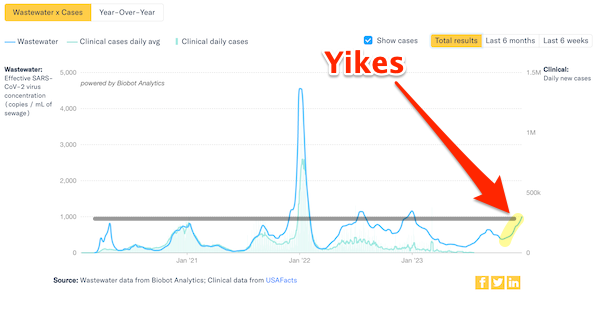
Lambert here: Still going up. As a totally “gut feel” tapewatcher, I would expect this peak to meet or exceed the two previous Biden peaks; after all, we haven’t really begun the next bout of holiday travel, or the next rounds of superspreading events celebrations. Plus students haven’t come from from school, and then returned. So a higher peak seems pretty much “baked in.” And that’s before we get to new variants, like JN.1. The real thing to watch is the slope of the curve. If it starts to go vertical, and if it keeps on doing so, then hold onto your hats.
Regional data:
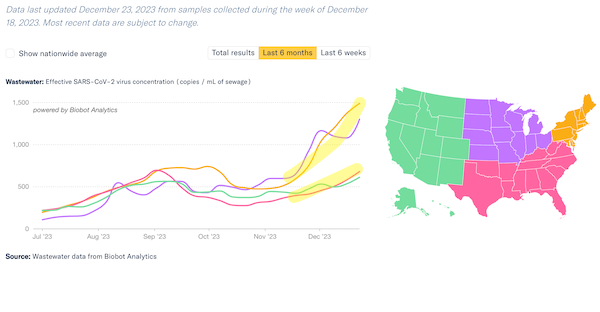
Regional split continues.
• Lambert here: Holy moley, we’re in the New Year, but the brain geniuses in charge of our public health system seem to have shut down wastewater data for the holidays, precisely when the potential for spread is greatest [pounds head on desk]. I checked the Verily dashboard and it’s as horrid as ever. Here’s the CDC’s map, last updated on December 25:
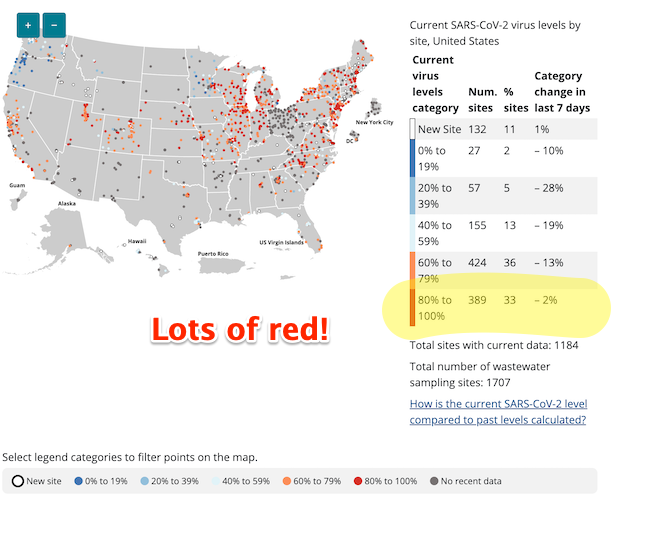
100% (red) means “highest ever.” Obviously, this map isn’t important to CDC, or they would have reworked it in soothing pastel colors.
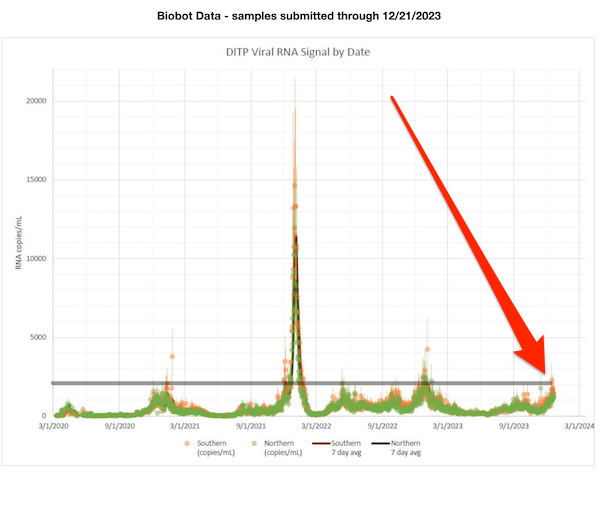
• Lambert here: This is the Boston-area MWRA wastewater data:

This data is old, too. But as you can see, the level is high. Boston is a college town, and this is before “the students come back”! So expect a spike.
Variants
NOT UPDATED From CDC, December 23:
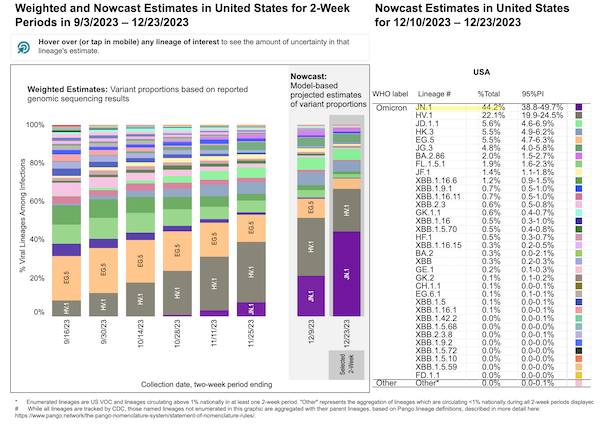
Lambert here: JN.1 now dominates. That was fast.
From CDC, December 9:
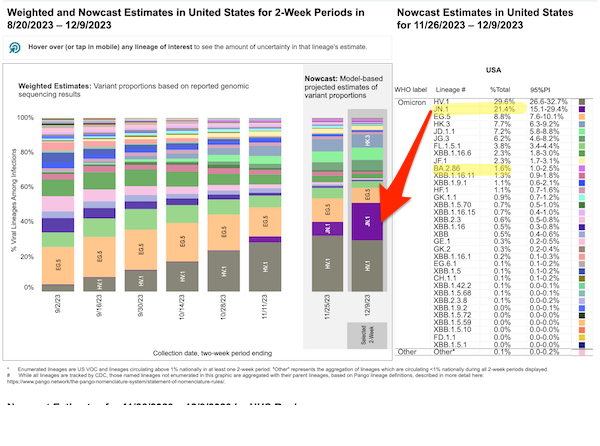
Lambert here: I sure hope the volunteers doing Pangolin, on which this chart depends, don’t all move on the green fields and pastures new (or have their access to facilities cut by administrators of ill intent).
CDC: “As of May 11, genomic surveillance data will be reported biweekly, based on the availability of positive test specimens.” “Biweeekly: 1. occurring every two weeks. 2. occurring twice a week; semiweekly.” Looks like CDC has chosen sense #1. In essence, they’re telling us variants are nothing to worry about. Time will tell.
Covid Emergency Room Visits
NOT UPDATED From CDC NCIRD Surveillance, December 23:

Lambert: Return to upward movement. Only a week’s lag, so this may be our best current nationwide, current indicator.
NOTE “Charts and data provided by CDC, updates Wednesday by 8am. For the past year, using a rolling 52-week period.” So not the entire pandemic, FFS (the implicit message here being that Covid is “just like the flu,” which is why the seasonal “rolling 52-week period” is appropriate for bothMR SUBLIMINAL I hate these people so much. Notice also that this chart shows, at least for its time period, that Covid is not seasonal, even though CDC is trying to get us to believe that it is, presumably so they can piggyback on the existing institutional apparatus for injections. And of course, we’re not even getting into the quality of the wastewater sites that we have as a proxy for Covid infection overall.
Hospitalization
Bellwether New York City, data as of December 29:
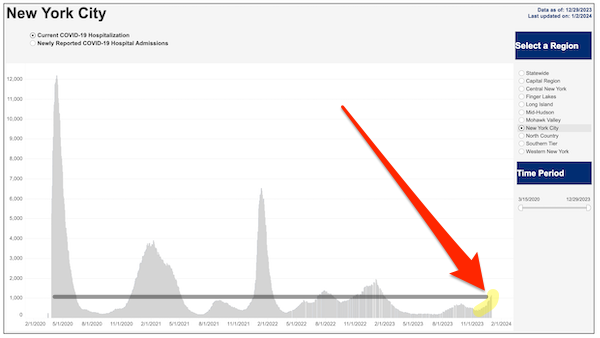
Lambert here: I still don’t like the slope of that curve, and notice we’re approaching previous peak levels (granted, not 2020 or 2022, but respectable).
Here’s a different CDC visualization on hospitalization, nationwide, not by state, but with a date, at least. December 23:
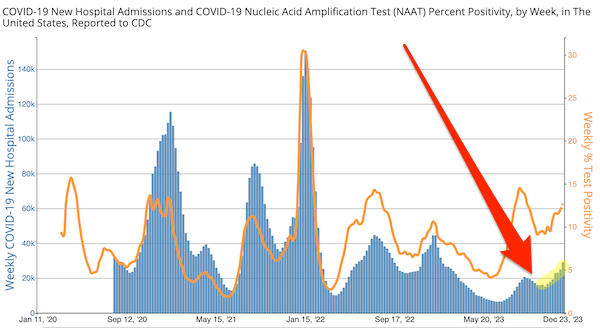
Moving ahead briskly!
Lambert here: “Maps, charts, and data provided by CDC, updates weekly for the previous MMWR week (Sunday-Saturday) on Thursdays (Deaths, Emergency Department Visits, Test Positivity) and weekly the following Mondays (Hospitalizations) by 8 pm ET†”. So where the heck is the update, CDC?
Positivity
Lambert here: Notice that for both Walgreens and the Cleveland Clinic, that although the percentage of positives is stable, the absolute numbers have greatly increased; Walgreen’s doubled. This speaks well of people; they’re getting tested before the holidays (and in face of a shit*tstorm barrage of propaganda and peer pressure to minimize, too).
NOT UPDATED From Walgreens, December 26:
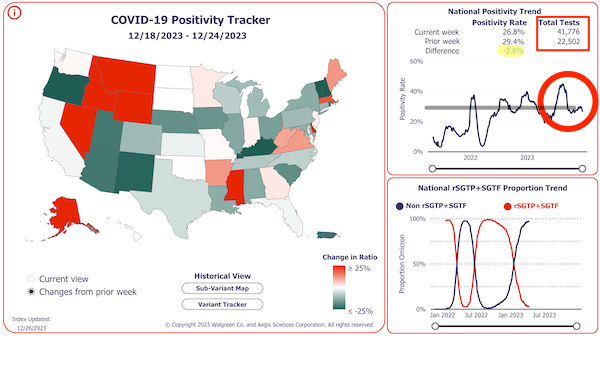
-2.3%. Down. (It would be interesting to survey this population generally; these are people who, despite a tsunami of official propaganda and enormous peer pressure, went and got tested anyhow.)
From Cleveland Clinic, December 30:
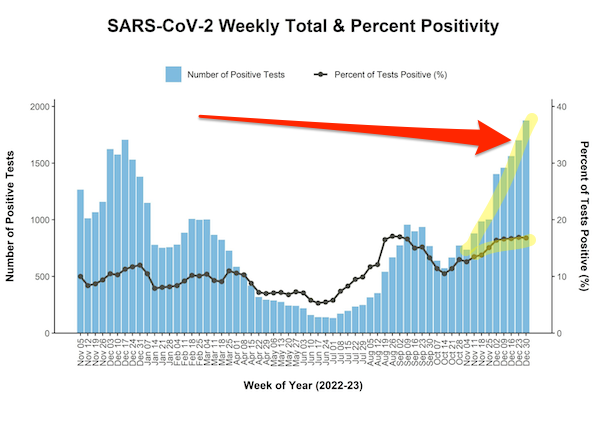
Lambert here: Percentage plateaued. Absolute numbers steadily increasing.
From CDC, traveler’s data, December 11:
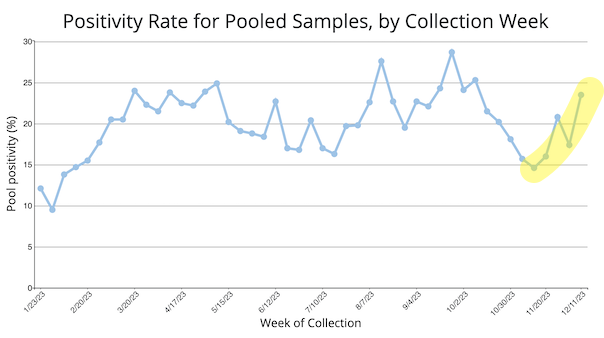
Turning down.
Down, albeit in the rear view mirror. And here are the variants for travelers, December 4:
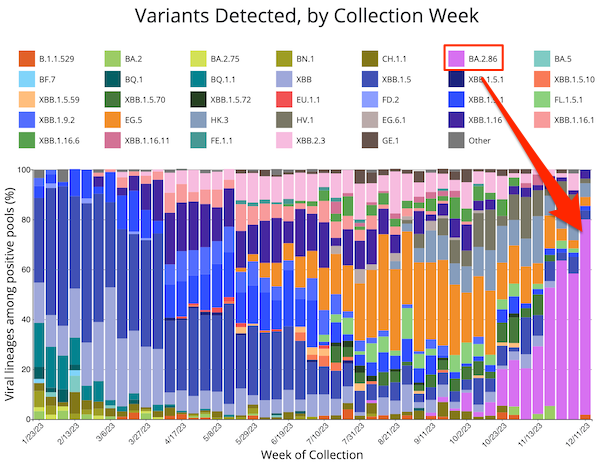
BA.2.86 back up, totally dominant. This would be a great early warning system, if the warning were in fact early, instead of weeks late, good job, CDC.
Deaths
NOT UPDATED Here is the New York Times, based on CDC data, December 16:
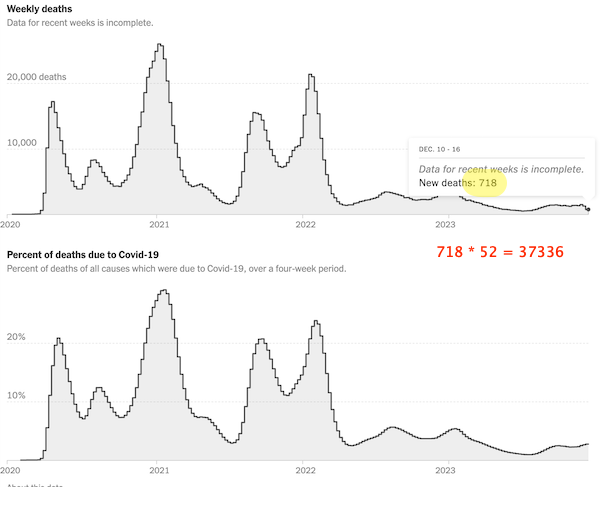
Stats Watch
There are no official statistics of interest today.
Today’s Fear & Greed Index: 76 Extreme Greed (previous close: 76 Extreme Greed) [CNN]. One week ago: 80 (Greed). (0 is Extreme Fear; 100 is Extreme Greed). Last updated Jan 2 at 3:25:16 PM EST.
Rapture Index: Closes up one on Volcanoes. “A volcano erupts in Iceland after weeks of quake activity” [Rapture Ready]. Record High, October 10, 2016: 189. Current: 188. (Remember that bringing on the Rapture is good.) NOTE on #42 Plagues: “The coronavirus pandemic has maxed out this category.” More honest than most! • What are they waiting for? A red heifer?
The Gallery
“How Camille Pissarro Went from Mediocrity to Magnificence” [The New Yorker}. “Yet [the Impressionists], having found themselves as a group in the café, became tested as a group only in exile. In 1870 and 1871, during and after the Franco-Prussian War and the bloody assault on the Paris Commune, many painters who could get out of France did so. (Manet stayed, making cool records of the massacre of the Communards.) Pissarro, whose official citizenship was Danish, exempting him from the mandatory Army service that French citizens were subject to, fled to England with Julie, joining Monet, Sisley, and the more academic Impressionist James Tissot. It was as if they were unconsciously creating in London the experience that generations of English and American painters would find in Paris: they remade their art in shared exile. During those London years, two things happened that would fuel all the rest. First, as Pissarro would emphasize, the painters were exposed to the late work of J. M. W. Turner, the oils and watercolors both. Turner’s nearly abstract but always high-keyed red and gold and violet landscapes fired the liberation of color that was integral to the Impressionist enterprise. Bright color had effectively been banished from painting for more than two centuries, as an enemy of form; the outdoor paintings of the so-called Barbizon school tended to be depressingly dark. But Turner used color in ways that were idiosyncratic to him and had been invisible in France. Subsequent commentators underplayed this crucial bridge between London and Paris, in part because it interpolates a Romantic element into the evolution of Impressionism, which sits uneasily with the simpler story of the painter in dialogue with nature. It mattered little that Turner’s color arose from Romantic rhapsody rather than from empirical investigation; in Pissarro’s reckoning, Turner was ‘perhaps the first who knew how to make colors blaze with a natural brilliance.’ Second, in a way that was just as important although more prosaic, the London exile saw the emergence of Paul Durand-Ruel as possibly the first entirely modern art dealer.” • I always thought the Impressionists and Turner were similar, but I never knew there was direct influence. Interesting! But doesn’t mention Bourdieu, who wrote a whole book on Manet. Bad form!
News of the Wired
“Thomas Cochrane” [How the Hell]. In lowercase bullet points: “• in general, he really liked explosives, and was convinced that most problems in life could be solved with a careful application of the right amount of explosives at a precise point in space and time.” • Quite a bio! Jack Aubrey, of Patrick O’Brian’s wonderful Aubrey/Maturin series, was modeled on Cochrane.
Contact information for plants: Readers, feel free to contact me at lambert [UNDERSCORE] strether [DOT] corrente [AT] yahoo [DOT] com, to (a) find out how to send me a check if you are allergic to PayPal and (b) to find out how to send me images of plants. Vegetables are fine! Fungi and coral are deemed to be honorary plants! If you want your handle to appear as a credit, please place it at the start of your mail in parentheses: (thus). Otherwise, I will anonymize by using your initials. See the previous Water Cooler (with plant) here. From TH:

TH writes: “This is a desert willow tree that lives, where it can be admired by all guests, near the entrance of the Outpost Café in Oak Hills, California.”
•Kind readers, I still am not comfortable that I have enough plants in the queue. Snow-covered trees! Icy flowers! The fall harvest! Autumn leaves! Last year’s wildflowers! Also, of course, honorary plants like fungi and lichen! Algae!
Readers: Water Cooler is a standalone entity not covered by the annual NC fundraiser. So if you see a link you especially like, or an item you wouldn’t see anywhere else, please do not hesitate to express your appreciation in tangible form. Remember, a tip jar is for tipping! Regular positive feedback both makes me feel good and lets me know I’m on the right track with coverage. When I get no donations for five or ten days I get worried. More tangibly, a constant trickle of donations helps me with expenses, and I factor in that trickle when setting fundraising goals:
Here is the screen that will appear, which I have helpfully annotated:

If you hate PayPal, you can email me at lambert [UNDERSCORE] strether [DOT] corrente [AT] yahoo [DOT] com, and I will give you directions on how to send a check. Thank you!
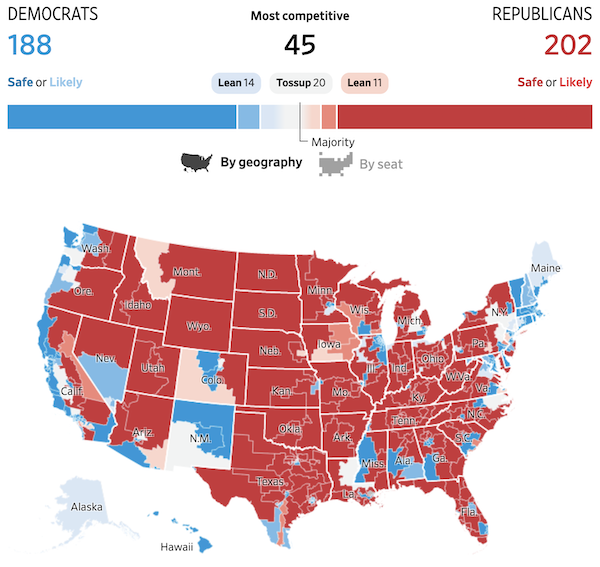
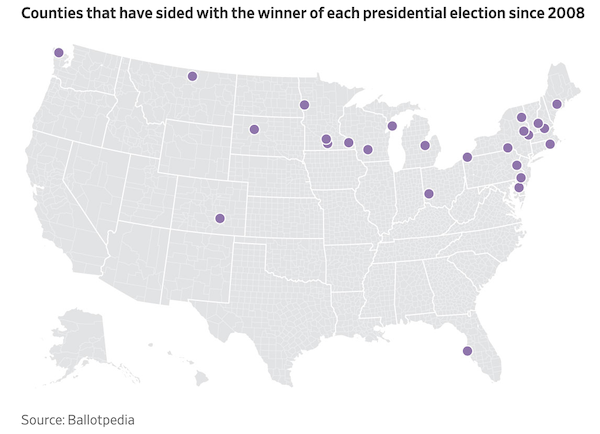



https://www.levernews.com/the-case-of-the-missing-health-care-providers/
The Case Of The Missing Health Care Providers
Many health insurers’ online provider directories are inaccurate or out-of-date, to the detriment of patients and health care professionals alike.
I encountered this situation while helping a family member on Obamacare.
I saw my Doctor in September, diagnosed with BPV (positional vertigo). Got a PT referral. They were supposed to call me in a “day or two”. No call. I called and left voicemail. No return call in a week. I tried again. No call.
Called my doctor and his PA called me back saying that the PT could see me in April.
Dr Google provided me with exercises and I resolved it in a week or two.
What’s happening?
I had this problem with trying to get CPAP equipment, and just pay out of pocket from a well known online retailer instead of dealing with local equipment providers.
Markets are a fantasy. There are a lot of situations where you just cannot buy a good or service even if you’re willing to shell out.
I ran into the same issue when I had to get a new doctor after the doctor I had been seeing retired. Looks like all the local clinics like the one I use have been bought out by PE. The county is down to one large hospital which has to date failed to get accredited after being bought by one of the giant hospital conglomerates, and all the smaller providers are now being bought up by the PE ghouls.
I cannot imagine what it’s like being doctor or nurse or healthcare provider. You are still stuck in a pandemic that everybody is supposed to pretend is over, and your new management is all about the benjamins.
#TheConstitutionalOrder
There must be some Obama-esque parody of Psalm 23 where someone can use “his Axelrod and his former staff shall comfort me” … 😂
… but I digress.
> The Wizard of Kalorama™, who presumbly has an alternative to Biden in mind. But how?
I would suggest that this is as they say, laying the groundwork for ’28 at this juncture. I think the Wizard is happy to let House Scranton and House Chappaqua fall flat on their faces here. But the collective memory politik must be inscribed with the wizard’s wisdom, so that when future battles take place to decide which wing effectively controls the selection of candidates, there will be a clear hierarchy based on events about to unfold. Too late for ’24 methinks … unless of course, COVID black swan or some such.
#TwentyTwentyFour
#GlasserNewYorker
Well … there goes my post new year’s serenity. The absolute brain-addled-ness. They are so high on their own supply. The horrid “all we have for sale here is fear” nonsense is gonna sink #ShitLibs so hard this year.
… perfect segue tooooooo …
#FrayingBidenCoalition
So laughable that people like Glasser are writing TDS nosh while ignoring the Wooly Mammoth in the room. “Democracy on the line” ignores the reasons behind a 24% and 26% drop in AA and Latin support respectively. The level of idiocy is remarkable.
#FryingBidenCoalition
Ha! That works too!
> I would suggest that this is as they say, laying the groundwork for ’28 at this juncture. I think the Wizard is happy to let House Scranton and House Chappaqua fall flat on their faces here.
Plausible, but I think it’s too early to be even thinking about 2028. I think if Mr. Wizard were really waiting for 2028, he wouldn’t be lifting even a finger now. Instead, he’s sending out Axelrod to make pronouncements. I don’t know if Obama has a plan, or single plan as opposed to a portfolio of plans, but I do think he wants to be, as it were, “in at the death.”
> but I do think he wants to be, as it were, “in at the death.”
Indeed, reminds me very much of “accelerate the endgame” (via NY Times) … but how?
Wizards gonna wizard …
RE: The Constitutional Order
Lambert, your post from yesterday about trying to give Trump the boot via the 14th Amendment set off a little light bulb in my head when you posted the full name of the lawsuit – In re: Challenges of Kimberley Rosen, Thomas Saviello, and Ethan Strimling; Paul Gordon; and Mary Ann Royal to Primary Nomination Petition of Donald J. Trump, Republican Candidate for President of the United States (emphasis added)
Ethan Strimling is an attention seeker extraordinaire who never saw an office he didn’t want to run for. He has been elected to one office or another, or has been trying to get elected, for most of the two decades I’ve been in Maine. I have seen him enter a room of movers and shakers, clad in track suit fresh from the gym, little beads of sweat glistening on his toned physique, striking a pose as he looks left to right to see if anyone notices his sleeve-free biceps. When he was mayor, I’ve seen him walk through downtown Portland, again looking to the left and right to see if anyone noticed him during his perambulations and might want to stop and talk (they didn’t). And lest NC readers think this is some sort of jealousy or misreading of the situation on my part, Strimling was once featured on the Daily Show years ago when he was a state rep. Someone in the state legislature had done something worthy of mockery and they sent a “correspondent” to Maine to get to the bottom of it. Camera went from Rep Mike Heath (the one who did something stupid), over to Strimling for the rebuttal, back to Heath, and then finally back over to Strimling, except this time the Daily Show wags referred to him “Captain Handsome”, so he clearly gave off the same vibes to their crew as he did to me and other Mainiacs. And did I mention that according to his own bio, which I can’t vouch for so won’t link to, he trained in theater at Julliard for three years? All of Maine’s a stage!
Strimling has also been involved with some decent non-profit charitable organizations in the past – not sure how much work he did personally, but at least he’s been affiliated with organizations ostensibly trying to do some good in the world, and I have been reluctant to criticize him too much. Until I saw his name on the lawsuit.
Strimling does not currently hold an elected position – voters showed him the door the last time he tried running for mayor of Portland. Being out of the limelight for a few years has likely produced a burning need to be noticed, thus his name on the lawsuit. It landed him an MSDNC interview already, which refers to him in the headline simply as “Maine voter” rather than attention seeking man slattern, a far more appropriate description if you ask me.
I enjoyed reading this alpha bob, thank you. Also
is hilarious. I would like that on my chyron if I were ever interviewed:
> Captain Handsome
Wowsers. What great detail. Truly the NC commentariat is the best commentariat. A little roach on Shenna’s wedding cake, no? I know she can’t pick her plaintiffs, but nevertheless….
Almost spit my food out at “attention seeking man slattern”. Excellent post, lyman alpha blob.
Your description reminded me of a character in Richard Russo’s book Empire Falls, which coincidentally takes place in Maine. Walt Comeau is the creepy antagonist who runs a gym, always wears form fitting t-shirts, and is having an affair with the book’s hero.
Richard Russo, for Updike fans who want more suburb.
Hey lyman alpha blob . . . but what do you really think of Ethan Strimling?
I’ve been reading NC for quite a while, but have never engaged with the commentariat before. I’m doing so now because, at the start of this new year, I have a question for the NC community as a whole, though I expect I’m going to get a variety of answers and probably end up as adrift in my decision making as I already am.
Without soliciting specific investment advice, and I guess as a question of practical philosophy, at this stage would I be wise to even invest in anything long-term?
I’m young-ish, and at the start of my full-time working life. I’m now pulling consistent paychecks of meaningful size, and am being presented with opportunities to start putting money into things like IRAs. Social Security I of course am automatically paying into as part of payroll deductions; regardless of whether SS will still exist when I’m old enough to claim it, I have no choice about putting money into it.
But I do have the choice with other retirement options. The way the economy, financial system, and American Empire itself are going, is it worth even seriously entertaining investments that will take thirty or more years to be called in? Putting money in CD accounts that will mature in a year or two seems very safe, but beyond that I’m very hesitant about what to do with my money.
NC has written extensively about corruption and under performance in private equity. But at this point, decades of uncertainty away from any future payout, is any form of equity a sound investment for me?
Of course, assuming the answer were no, what then would be a better use of my money. Because at the extreme other end, I find ‘guns and canned food’ survivalism a bit silly.
Thank you for any responses I might get.
I share some of your concerns about the economy. I have some investments, and I often wonder if me and my family are being foolish, trusting our future to the corrupt, crumbling runaway train of late capitalist rentierism. The argument for investing early (and you’d be starting way before I did) is that small contributions now will yield big results in the future. Stick with index funds, make sure you’re diversified to insulate yourself from market volatility, don’t obsess over daily ups and downs–very traditional advice. If you feel uncomfortable making decisions on your own, maybe look into finding a financial advisor to help–someone just starting out, who will help you for a flat fee initially on the hope that it’s going to work out for them later (that’s what we did). Alternatively, you could look into (safe) real estate, if you’re uncomfortable with the stock market. If the whole edifice comes crashing down–an idea that most financial people regard as ridiculous, unsurprisingly–you and me will be far from the only people cursing our luck. And we’ll have bigger problems than the state of our portfolios, I think. Investing is the prudent thing to do, I’m told, and if you can afford it, you should do it.
I struggle with this myself, and ultimately, if the system completely collapses, what you do or do not do with your money won’t matter at all. But it’s certainly possible that society doesn’t entirely collapse, and then it would be nice to be able to retire someday, wouldn’t it?
So I think the usual advice probably applies. Save up an emergency fund worth 6 months of expenses, keep this ready cash in a high yield savings account. Google is your friend here. In additional to checking account and high yield savings account, you might look into a 4-week treasury bill ladder for the remaining funds. Keep your credit cards paid off. Pay off any outstanding student loan balances at an accelerated rate if you can. If you have access to a 401(k), invest up to the employer match; that’s free money. Select a total market fund with the lowest expense ratio the 401(k) offers.
After that, at your option, you could invest in a ROTH IRA if your income is below the threshold. Another option is a regular brokerage account, taxable, but it’s your money to do with as you please. Again, a low cost index ETF is best here. Vanguard is very popular, with good reason, such as VTI. As always, investment losses are possible, so don’t invest any amount that you can’t stand to lose; ideally you’ll hold for 30+ years.
You might opt for a high deductible health plan, because you can get an HSA account with it. There can be some benefits for this, but it can require a complex spreadsheet of calculations to fully determine whether an HMO or PPO plan or an HDHP with HSA is best. When in doubt, pick a PPO plan w/ a low co-pay and co-insurance. An employer might offer additional benefits, but I’ve never taken any but health, dental, and vision. Getting your own life insurance is gonna be cheaper as well. I’d avoid the QTE transit expense account; the money vanishes if you don’t use it every year, or leave your employer. I regret ever opting for this, not that I’m outside a city and thus have no subway transit option.
It’s hard to reconcile this with the current state of the world, but if the world does not end, you’ll be better off with more money than less money, and investing in low cost funds in a mixture of tax-free and taxable accounts is a way to accomplish this, after you’ve got 6mo+ of living expenses saved.
While there are alternative investment ideas some people like, I’d avoid bitcoin and crypto “currency” entirely; I’m also not a precious metals person.
Also, keep your expenses in check, and I’d recommend monthly budgeting, and always being aware of what you’re spending on. This is key to keeping spending under control. While I use Quicken for the convenience, it isn’t free, and for basic stuff a spreadsheet or pen and paper can work as well.
With SARS2 induced clinical and subclinical damage, I’d expected the lack of healthy workers to work and consume to be a problem, but thus far, the great capitalist wheel continues to turn unimpeded. How long this might be, who is to say? I thought last year would be the year, but I’m clearly very very early in that call. It could be years, perhaps decades, until the account finally comes due.
In the meantime, live as comfortably and safely as you can.
Good luck!
If you have two spare brain cells, just buy this no load S&P 500 fund. Add to your position every month come Hell or high water. Come what may, during good times and bad, buy $500/month and you’ll be happy when you turn 65.
Full disclosure; I don’t a hoot if you follow my advice, or not because there’s nothing in it for me.
I did not save for retirement when I was young (1980s and 90s) because I had no confidence that either Wall Street or the retirement system would still be around when it came time to retire. I’m now approaching retirement age and so far the system is still chugging along, although many people got massively screwed out of pensions and investments along the way.
I’m putting money into retirement accounts now because it gives me a big tax deduction and I can take the money out any time without penalty. As things turned out, there was a definite downside to my choice – I did not get 30+ years of compound growth on my retirement funds. On the other hand, I was pretty broke back then so I wouldn’t have saved much.
What I eventually did instead of investing in Wall Street was to prepare myself for a career that I could probably continue doing into my 70s if necessary (I became a lawyer in my late 30s). I also bought a house, and then bought several more during the big buying opportunity around 2009-2010. That turned out well for me, and should usually turn out at least somewhat OK if the house is in a stable community. In my opinion, choosing to live in a stable community is also an investment, at the cost of (for example) not being able to live in a place like Silicon Valley during a boom.
Today you can get reasonable interest rates on treasuries and bank accounts, so basic cash saving is a no-brainer. Beyond that it’s up to you, but based on personal experience I would say you shouldn’t take nihilism too far – you have to plan for some future unless you’re OK with sleeping under an overpass when you’re 70.
My old mentor told me to invest in Gold, Crowbars and unimproved real estate. I sort of followed his advice in buying gold as well as silver. both of those have gone up many hundred percent, the crowbars I invested in Steel, like tractors, implements and good tools. The unimproved real estate I went to good farm land which has gone up in price as well.
Build community and the local resource bank.
I think Jason is spot-on — if the system completely collapses it really won’t matter, but if it doesn’t it will matter.
Something that hasn’t been mentioned here yet that you also may want to consider including are Series EE savings bonds from the U.S. Treasury which are guaranteed to double in value in 20 years.
Hi Albe,
There’s a lot of really good information in all of the responses; I’ll throw in a few more general thoughts. I’m at the end of my career so what worked for me (and worked in my work life) will probably not be the same as what might work for you, but there are a few enduring themes that really do stand the test of time.
Before you decide where or how to save, you need to determine why you want to save. In other words, what’s your objective? Is it for retirement, buying a house, paying for an education, etc. The “why” will, to a certain degree, determine the what and the how. For example, don’t put money you’re going to need in 6 months in a long-term investment vehicle. Whatever the objective – keep the actual investing simple. The financial services industry makes their money through churn and complexity. Buying treasuries and a buy and hold strategy in a stock index fund will not make your investing firm much money – and that is a good thing. Keep your expenses as low as is possible. This is true not only in investing but in life in general.
Live below your means and pay yourself first. If you have an employer-sposored 401k it can be a good savings vehicle – it puts the investments on autopilot (similarly, having an automatic deduction from your regular pay invested in an IRA or Index fund is a similar autopilot). If you get a raise (or bonus), put half away or increase your savings by half of the amount. As you do this you’ll find that you can live on less than you think you can.
Watch out for debt. Interest never sleeps.
Read as much as you can – don’t focus on the “how to get rich” or “how to trade” books but read about market history and investing history. What you’ll find is that there’s nothing new under the sun. One old favorite is “Where are the Customers’ Yachts” by Fred Schwed (written in 1940). John Bogle and the “Bogleheads” have good insights. And of course a shout out to Econned by Yves Smith about the 2008 market meltdown. Once you start on a few like this, you’ll find more that are fun and insightful. You’ll chuckle at enduring human folly.
Finally, the NC crowd skews older and I’m sure that most will agree that time goes MUCH more quickly that you can imagine. Starting early really does make a huge difference as you’ll have decades to save. Even saving a little today will make a great deal of difference in 40 years.
> at this stage would I be wise to even invest in anything long-term
I don’t play the ponies.
What I would say is that as long as there’s capitalism, there will be something to invest in. If you read William Gibson’s The Peripheral as a portrait of the Jackpot, you will see that in the near future of a timeline close to ours, pre-Jackpot, “Hefty Mart” and “Pharma John” would be solid choices. For the timeline post-Jackpot, nano-technology, media properties, public, mercenaries (although, thinking about it, Gibson’s post-Jackpot timeline is remarkably free of economics. Who pays these people, with what, and why?)
I would encourage you to broaden your notion of investment, however, from economic capital to social capital, both in terms of “networking” as the term is commonly understand, and as a form of collective learning and shared understanding. Over the long haul, social capital will, IMNSHO, be more resilient than economic capital (at least as conceived of as money in CD accounts).
2 Important things to remember:
The game is rigged.
Don’t fight the FED.
I’m a professional speculator, retired. I’ve extracted a huge amount of money from the markets on behalf of my clients.
The game is rigged and there are a lot of opportunities to pay fees for zero value in return. You can’t compete with the pros
The US economy is resilient. Lots of potential for crashes and such but people still want to buy stuff and others want to make or source stuff to sell. Long term bet on the stock market is probably the best bet, in the lowest cost way. Compounding over the long term is powerful
Trying to pick winners and trade your way to profits is not recommended…. You will be up against me and my gang. It’s gambling without an edge.
Investing is transferring wealth ( whatever that might be) to the future.
In 2034 you are going to want to eat about 1000 meals and you can’t buy them now ( unless you want to store your mountain house for a decade…)
The game is taking risks that you get paid for taking.
Winning is a combination of building the best portfolio of risks AND having luck and time on your side
Between the Rose Bowl Parade, too much food and too much football, I missed Lambert’s post yesterday on Section Three of the Fourteenth Amendment. I exchanged some emails with Lambert this morning, telling him that I hoped to post something today in response, and he and I have agreed in advance that each of us is free to be wrong.
I am a retired attorney and, in the interest of full disclosure, a former student of Prof. Tribe in his Constitutional Law class at HLS. Later, as a practicing attorney, I hired Larry to be co-counsel on an appeal which we were taking to the Supreme Court. I have corresponded briefly with him about the Baude and Paulsen article [hereinafter B & P], https://papers.ssrn.com/sol3/papers.cfm?abstract_id=4532751, and I happen to agree with the position he and Judge Luttig have taken, thereby putting me in opposition to Lambert’s conclusions.
Let’s start at the beginning. After the elections of 1866, the Southern States sent back to Congress “four Confederate generals, four colonels, several Confederate congressmen and members of Confederate state legislatures, and even the vice president of the Confederacy, Alexander Stephens.” B & P, at 4. The Senate refused to seat Stephens, and Congress soon began to draft the Fourteenth Amendment. The effort went through a number of drafts before the final language was agreed upon, but the basic idea behind Section Three was that oath-breaking insurrectionists would be disqualified from holding office in the future, unless Congress removed that disability. They could vote, just not hold office. Congress was also given the ability to enforce this provision, just as it was given the ability to enforce other provisions of the Fourteenth Amendment and the Thirteenth Amendment.
With the passage of 150 years or so, it has become clear in our jurisprudence that it is not necessary for Congress to have acted for these amendments to be effective; that is, they are self-executing.
B & P in their lengthy law review article, which they spent about a year researching and writing, properly note that the Griffin Case is problematic. That was a case in Virginia where Griffin was convicted of a crime before a judge who was certainly covered by Section Three of the Fourteenth Amendment. Griffin did not seek the removal of the judge from his position, however, nor did he complain about the conduct of the trial, the evidence, or anything else about his conviction. Instead, he wanted the conviction voided because the judge was disqualified from holding office. That was the “chaos” Chief Justice Salmon was worried about, not the chaos of 50 States trying to apply Section Three to this year’s presidential primaries and general election, as Lambert writes. Interestingly, at the end of his opinion, Chief Justice Salmon cryptically wrote “that I am authorized to say that they [the other Justices] unanimously concur in the opinion that a person convicted by a judge de facto acting under color of office, though not de jure, and detained in custody in pursuance of his sentence, can not be properly discharged upon habeas corpus.” https://law.resource.org/pub/us/case/reporter/F.Cas/0011.f.cas/0011.f.cas.0007.html In other words, that should have been the basis for his decision, not all the language about Section Three needing some legislation from Congress in order to be effective. If legislation were needed, there would have been no need for Congress to pass the Amnesty Act of 1872, removing the disqualification of Section Three for all but about 500 former Confederates. Griffin’s Case remains the decision of a single Justice, and it seems doubtful that today’s Supreme Court would be ready to jettison all of the other cases regarding the self-executing nature of the Thirteenth and Fourteenth Amendments to adopt an exception for Section Three of the Fourteenth Amendment, but we’ll soon see.
Now, recognizing that Lambert has admitted to IANAL (“I am not a lawyer”) and that Matt Taibbi is similarly not a lawyer, let’s explore a few other things Lambert got wrong.
First, the burden of proof for Judge Wallace in the Colorado District Court was the preponderance of the evidence. That is established by Colorado statute, as she noted in her decision rejecting Trump’s argument that it should be the higher standard of clear and convincing evidence. https://www.courts.state.co.us/userfiles/file/Court_Probation/02nd_Judicial_District/Denver_District_Court/Cases%20of%20Interest/10_28_2023%20Order%20re%20Donald%20J_%20Trump's%20Brief%20Regarding%20Standard%20of%20Proof%20in%20This%20Proceeding.pdf In her final decision, she noted that the proof met the preponderance of the evidence standard, but that if clear and convincing evidence was required, the evidence also met that standard.
https://www.courts.state.co.us/userfiles/file/Court_Probation/02nd_Judicial_District/Denver_District_Court/11_17_2023%20Final%20Order.pdf On appeal, the Colorado Supreme Court assumed that preponderance of the evidence was the proper standard and that Trump had abandoned his clear and convincing argument on appeal. p. 15 n.2 and p. 25. https://www.courts.state.co.us/userfiles/file/Court_Probation/Supreme_Court/Opinions/2023/23SA300.pdf
More recently, in Maine, the Secretary of State applied the preponderance of the evidence standard, as she was obliged to do under Maine law. She takes an oath to support the Constitution of the United States both under Article VI of the U.S. Constitution and under the Maine Constitution, so when Maine law provides that she must first evaluate the qualifications of a candidate, she must follow her oath to support the U.S. and Maine Constitutions.
Now, it’s easy today to argue that Congress should have provided some means for the States to enforce Section Three in a uniform fashion for presidential candidates, but for over 150 years the country had no need to worry about our presidents becoming oath-breaking insurrectionists. The States simply have to act within their framework of laws and do the best they can. In Michigan and Minnesota, the courts have concluded that their state laws don’t give the Secretary of States the authority to determine qualifications for the primary ballot, but they have reserved the question of disqualification at the general election stage. Therefore, the Republican Party is on notice that if they wind up nominating Donald Trump for the general election ballot, they risk having that candidate disqualified. Up in Oregon, the Petitioners there have based part of their argument on “issue preclusion” under Oregon law, which basically precludes a losing litigant from contesting facts and law that have been found against him/her in another proceeding, even in another State. https://freespeechforpeople.org/wp-content/uploads/2023/12/s070658._response_landmark_amicus_motion.pdf That is an argument similar to the offensive use of collateral estoppel, which the Maine Secretary of State noted in a footnote, but did not base her decision upon.
Back to where we began, with the election of 1866 and the Confederates, such as Alexander Stephens, who were sent to Congress. Stephens was the Vice-President of the Confederacy, famed for his “Cornerstone Speech”, in which he proclaimed that “The new constitution has put at rest, forever, all the agitating questions relating to our peculiar institution African slavery as it exists amongst us the proper status of the negro in our form of civilization. This was the immediate cause of the late rupture and present revolution.” He also said “Our new government is founded upon exactly the opposite idea; its foundations are laid, its corner-stone rests, upon the great truth that the negro is not equal to the white man; that slavery subordination to the superior race is his natural and normal condition. This, our new government, is the first, in the history of the world, based upon this great physical, philosophical, and moral truth.” https://www.battlefields.org/learn/primary-sources/cornerstone-speech Later, as Baude and Paulsen note, he testified that he had not joined the rebellion voluntarily! B & P at 99 n.358. Clearly, Stephens was not a person who took his oath to support the Constitution very seriously, if at all.
With the passage of time, one might even argue that the Amnesty Act of 1872 helped lay the foundation for ending Reconstruction in 1877 after the Hayes-Tilden debacle. Southern States then began the serious effort of disenfranchising the newly freed slaves, creating a regime of terror and solidifying Jim Crow for nearly a century. Perhaps the Republicans who proposed Section Three of the Fourteenth Amendment had it right when they worried about allowing insurrectionists to return to office. They allowed them to vote and did not require any criminal conviction before disqualification kicked in. Otherwise, trials would have been required for every former officeholder who engaged in insurrection or rebellion.
Lambert, I respectfully dissent from your opinion.
It sounds as if you know your stuff, but I see you use the phrase “oath-breaking insurrectionists” to justify the actions of the Maine SOS. With so many of these outcomes, we have public officials of one sort or another telling us that they are absolutely impartial (as the Maine SOS said in her decision) and their only fealty is to law, nation, and the Constitution. Most of the Supreme Court nominees of the last few years, for example, swear up and down in front of Congress that they had no opinion on Roe and that they only follow the Law, when it’s clear that they’re passionately anti-abortion. If you tell me that Trump and/or his followers are “insurrectionists” as if this is a matter of fact, you can tell me you’re offering an impartial analysis all you want, but I suspect you made up your mind well before you started considering the legal background of the decision.
I was initially persuaded by the Baude and Paulsen article, and I am also persuaded by the Colorado District Court’s findings of fact. It will be difficult for the Supreme Court to ignore those findings, because the general rule is “[a] finding is ‘clearly erroneous’ when, although there is evidence to support it, the reviewing court on the entire evidence is left with the definite and firm conviction that a mistake has been committed.” United States v. United States Gypsum Co., 333 U.S. 364, 395 (1948). Otherwise, the factual findings stand. We also have the full record of the January 6 Committee.
Yeah, the Democrats managed to do an end run around actually charging Trump with insurrection by getting their hearings accepted by a Democrat court as part of the factual record. I just wish they were as feral and smart about stuff that, like, benefitted voters, but here we are. L[
Actually, Colorado uses a nominating process from a small commission to select its Supreme Court Justices. This is a process that, with variations, some 22 States utilize. https://ballotpedia.org/Assisted_appointment_of_state_court_judges As opposed to, say, Alabama or Wisconsin, where millions of dollars are poured into judicial election campaigns. Colorado uses what is called assisted appointment with a Governor-controlled judicial nominating commission. https://ballotpedia.org/Colorado_Supreme_Court Of the various methods used to select judges for a state supreme court, this is about the most fair solution.
It’s certainly a well-engineered process, since all seven of the judges are Democrats. Hey, what’re the odds?
In any case, this comment is clearly non-responsive. The manner in which the Democrats achieved control of the institution isn’r relevant to the “end run” that resulted.
Indeed. I might claim to be the Emperor of the Moon, and given that it’s currently unoccupied and the legal standards for what constitutes ownership in outer space are extremely vague, I’m quite sure I could find a constituency of some size that would agree with me, however that still does not in any way make it so.
If a bunch of people in buffalo hats taking selfies, many of whom were gently led into the Capitol by the police, constitutes an insurrection, then so does the concerted, years long effort to manufacture blatantly false stories linking Trump to some sort of Russian plot by his political opponents. Because I said so.
More people died and were injured in the January 6 event than died or were injured when cannons fired on Fort Sumter. Back in 1861 the only casualty was a mule, which was killed.
If we want to get picky, do not forget about the union soldier accidentally killed and at least one other injured during the surrender and handover ceremony for Fort Sumpter. I forget the details although I believe it was an exploding cannon.
Apple, meet orange.
Correct me if I’m wrong, but I believe the insurrection that started at Fort Sumter lasted another several years with fully outfitted armies going at each other, cities burned to the ground, and hundreds of thousands of dead and wounded.
Contrast with “Jan 6th” which is so referred to because it lasted for two hours on one day only, where the cops unnecessarily (see anyone can make a judgment!) killed one unarmed person and a few other out of shape people had a heart attack. While many others were gently led into the capitol building by capitol security.
But I’m not a lawyer, so what do I know?
I agree that the riot wasn’t an insurrection. The big picture election nullification project of which it was a part is a “something” that should be as assessed as well as the individual parts. Some of the matters being sorted out in the courts address this larger picture.
One recently widely circulated video purporting to be protesters being gently led in has been countered with a timestamped video proposing that they were being led out at the end of the day, while concurrently violent encounters were still taking place in other locations.
I haven’t seen the timestamped video you’re referring to. I have seen videos from three years ago, as have millions of other people, of cops removing the barricades in front of the capitol to let people through and that was definitely done to let people in, not out.
Somehow this intensive investigation of the events of that day hasn’t managed to uncover how that happened, even though the capitol police had successfully done their jobs against far larger crowds of protestors in the recent past.
As far as I can tell, Trump doesn’t make plans – he shoots from the hip, spouts off, says stupid stuff which often contradicts earlier pronouncements, etc. To think that he formulated some long term plan to hold on to power beggars belief. The whole ‘stop the steal’ schtick was just trolling to get better ratings and stay in the spotlight, and the Democrat party swallowed it hook, like and sinker. Internet has been here for 30 years now and still they haven’t learned to not feed the trolls.
Some people broke in, fought with cops, and trashed the place; others just walked in and wandered around. I don’t know how capable Trump would be of organizing a complex project, but he’s good at starting and keeping the ball rolling and surrounding himself with enablers. In August 2020 he was saying if he lost it would because Democrats cheated. He’s already started for 2024 where the “other side” is apparently Republican primary candidates.
https://www.mediaite.com/politics/the-other-side-does-cheat-trump-accuses-gop-primary-rivals-of-trying-to-rig-the-iowa-caucus/
Thanks. Personally I think Lambert is giving far too much benefit of a doubt to the Amendment 14 crowd and this is yellow wader territory. Turley, no friend to good ole Larry back at HLS, also thinks the SC will easily decide to throw out these ballot blocks and even hopes that it will be unanimous.
But if that does not happen then we likely will get the insurrection that the Dems so devotely wish for and even think is already going on. It may be the only way they can keep the horrendous Biden in power. I don’t think Trump should run again and if Biden had stepped aside I don’t think he would be. But all this bickering including 1/6 is the result of a real attempted coup after the 2016 election and the Dem’s inability to be the populist party they claim to be. Instead they aspire to be the Harvard Law School party, long may it wave. Lawyers are trained to be advocates. Right and wrong are well down the list. Advocates on the other hand like to win and so the law becomes “lawfare.”
Thanks for sharing your thoughts and some historical detail.
In my “not a lawyer” opinion the question with these ballot cases isn’t who gets to decide to disqualify Trump from the ballot on 14th amendment grounds. It’s who gets to decide it was an insurrection, and also what is the scope of “it.” Is the opinion of a state official that there was an insurrection and Trump was engaged in it more or less authoritative than the apparent opinion of the special counsel not to charge Trump with insurrection?
There was, imo, a project – started months before the election – for Trump to remain president if he lost the election. Some elements of the project were legal, others not. There were elite and non-elite participants. There was some coordination (conspiracy?) in some aspects of the project and, particularly in participation in local harassment and the Capitol riot, some actions which were at least in part ad hoc. Who should decide that some or all of that is what, under the Constitution or the federal statute, would be an [attempted] insurrection?
I suspect that this will be the ultimate ground of any decision by the current Supreme Court – whether a state court (in a state largely controlled by an opposing party) can hold a non-criminal disqualification trial and issue a decision that is binding and entitled to full faith and credit from other states.
It is pretty well established that states cannot add or subtract from requirements established by federal law for holding federal office. That’s how state term limits and residency requirements for Congress got overturned. The difference in this case is that the Colorado court based its decision on the requirements of the U.S. Constitution, not a requirement of state law.
So then the question becomes whether a decision by a state court interpreting federal law can be a state infringement on a federal requirement for office. I suspect it can if the conservatives on the Supreme Court don’t like it. For purposes of the takings under the fifth and fourteenth amendments, some of the conservative justices have taken the position that an unreasonable ruling by a court about property law can be a taking by the state. I suppose they could similarly rule that an unreasonable ruling by a state court on requirements for federal office is not allowed.
Of course, it would be much simpler and clearer just to interpret the insurrection clause. But as with Bush v Gore, modern conservatives hate doing anything that would limit their ability to flip flop and make the opposite ruling a few years later when the shoe is on the other foot.
By the way, for all you “I am not a lawyer” folks, there is exactly one principle of law that is binding on the U.S. Supreme Court as currently constituted. That principle is called the Rule of Five – it takes five votes to win.
I’m a still practicing lawyer but not a constitutionalist and have moved on to international stuff – though I did study under a very fine professor in a school across the Charles and try to keep up, just out of professional curiosity. I was also persuaded by the argument in the B&P article and have been trying to imagine how the USSC overturns Colorado on appeal.
My thought is that there is an argument to be made that that section of the 14th was drafted for the specific purpose of disqualifying insurrectionists of the time and that the Amnesty Act shows that Congress did not intend for the disqualification to apply after the wounds of the war had begun to heal. It’s a stretch but I think that’s the kind of look we’ll see from the Trump justices, Alito and Thomas.
The Fourth Circuit concluded that the Amnesty Act of 1872 lifted the disqualification only for those who had engaged in the insurrection we call the Civil War. Trying to apply that Act to future insurrections would amount to an amendment of Section Three, an action Congress could not take on its own. Cawthorn v. Amalfi, 35 F. 4th 245 (4th Cir. 2022).
> future insurrections
From The Journal of the Civil War era:
I find the constant conflation of the Civil War and the January 6 riot tiresome, tendentious, and question-begging.
Section Three says “insurrection or rebellion,” so it’s a nice point whether the two words are to be consideded synonomous, or phrased in the alternative.
I can see some open holes in Cawthorn that another, more conservative, Circuit could run a case through to create a conflict for the SC to resolve. Notably, there’s very little there in legislative history and a point of grammar that seems disputable. “Crumbs” are not a basis for a constitutional ruling.
@Lambert – I recommend that you have a read because there’s something there for your deconstructive eye. You’ll spot it right away.
https://casetext.com/case/cawthorn-v-amalfi
As an aside, I think Cawthorn’s legal team made some specious arguments that were particularly irritating to the judge – a Biden appointee, btw.
Here is the text of the Amnesty Act of 1872:
I don’t see how anybody could read that as anything other than retroactive (not not prospective).
As to Congressional “intent,” one would have to investigate the record. My guess would be that nobody had a second Civil War in mind.
> oath-breaking insurrectionists would be disqualified from holding office in the future, unless Congress removed that disability
Certain oath-breaking insurrectionists, as described in the text of Section Three (this is the “officers of the United States” controversy, where learned authorities disagree).
> With the passage of 150 years or so, it has become clear in our jurisprudence that it is not necessary for Congress to have acted for these amendments to be effective; that is, they are self-executing.
Clearly not, or Section Three of the Fourteenth Amendment would have self-executed when Eugene Debs ran for President in 1920. It wasn’t (yes, I’m quoting a conservative organ on Eugene Debs, but that is where we are).
> What was the “chaos” Chief Justice Salmon was worried about, not the chaos of 50 States trying to apply Section Three to this year’s presidential primaries and general election, as Lambert writes.
Chase was elucidating a general principle to be applied in future. Because I disagree with Baude and Paulsen that “inconvenience” is the core of the Griffin (it’s “ascertainment”), I didn’t focus on the “chaos” argument very much. However, I added this passage from Chase to the Conclusion on rereading the post the following day. You may therefore have missed this, for which I apologize:
I argue that “great public mischief” is exactly what will happen when we disqualify Trump under two different evidentiary standards, in two different branches of government, in two states, let alone what happens with a combinatorial explosion when there are more states and more standards, all of which accept that there’s a “reasonable doubt” that Trump is an insurrectionist. I don’t think the dogs are gonna eat that dog food. I’m a non-denominational leftist, and even I can see the problems, so just imagine how committed Trump supporters will react. Not well, would be my view. All that’s why Section Three should have been implemented under Section Five, leading to a single national standard, as Chase correctly advocated.
> If legislation were needed, there would have been no need for Congress to pass the Amnesty Act of 1872, removing the disqualification of Section Three for all but about 500 former Confederates.
One might also urge that the Amnesty Act of 1872 was the only implementation of Section Three under Section Five there is (and that “nobody expects the Spanish Inquisition,” and so Congress felt no need to write legislation for future insurrections). The argument that Section Five is a hood ornament makes no sense to me at all. And it seems a very strange position for originalists like Baude and Paulsen to take.
> Now, it’s easy today to argue that Congress should have provided some means for the States to enforce Section Three in a uniform fashion for presidential candidates, but for over 150 years the country had no need to worry about our presidents becoming oath-breaking insurrectionists.
Needs revision:
> In her final decision, she noted that the proof met the preponderance of the evidence standard, but that if clear and convincing evidence was required, the evidence also met that standard.
Thanks for the qualification on Colorado. However, it’s beside the point with regard to my thesis. The core problem is that the standards across states are different (and are certainly potentially so; Baude and Paulsen see this as entirely unproblematic). That is what will, over time, create the “mischief.”
> More recently, in Maine, the Secretary of State applied the preponderance of the evidence standard, as she was obliged to do under Maine law.
The word “preponderance” appears nowhere in “In re: Challenges of Kimberley Rosen.” As I show in the post, Rosen was decided under administrative law. This was neither a civil or a criminal case.
My post makes two core points:
1) The core of Griffin is not “inconvenience” but “ascertainment.” How are we to ascertain that an individual is an insurrectionist? It’s not that easy, or Democrats would have charged Trump and the other rioters with insurrection, and wouldn’t need to make the definition of “insurrection” ever more capacious. Section Five empowered Congress to fix the rules for ascertainment; they did not; and here we are, with a mishegoss of different branches of government using different standards of evidence to disqualify the only elected chosen by the entire country. It’s now up to the Supreme Court to clean up the mess. Not my job, and I’m not sure it’s even possible, let alone for these guys, but we shall see.
2) Disqualifying Trump under different standards of evidence* in multiple jurisdictions will create the “great public and private mischief” of which Chase warned. Half the country won’t stand for it, and why should they?
NOTE * I am not arguing that this or that standard is best, although obviously “beyond a reasonable doubt” would be best, not because a criminal trial is a prerequisite for the execution of Section Three, but because that is the standard that most voters — the people who really matter here — would accept. But there should be a single, national standard, across all jurisdictions. Anything else is beyond absurd (unless one doesn’t believe that all votes count equally, of course).
https://courts.uslegal.com/jury-system/constitutional-right-to-a-jury-trial/
https://www.lawinfo.com/resources/criminal-defense/is-the-presumption-of-innocence-in-the-consti.html
What Does It Mean for Those Accused?
For those accused of crimes in the United States of America, the presumption of innocence and guilt beyond a reasonable doubt means that the burden of proof is on the prosecution to show that you broke the law. People sometimes assume you go to court to prove you are innocent, but this isn’t true. You have no obligation to do so. Criminal defense strategies usually center more on poking holes in the prosecution’s case.
The criminal justice system starts with the understanding that you’re innocent. This only changes if the prosecution establishes guilt to a degree beyond reasonable doubt. You don’t have to prove anything if the prosecution doesn’t meet this burden.
—————————
if you think he is guilty, charge him, and let a jury of his peers vote on it.
we have over 300 million people who have come to the conclusion, they are right. the founders feared people like you, the chaos.
otherwise you are from a long long line of individuals that think they are above the law, and hold kangaroo courts.
above the law
phrase
Exempt from the laws that apply to everyone else.
Wiktionary, Creative Commons Attribution/Share-Alike License • More at Wordnik
kangaroo court
noun
A mock court, especially one hastily improvised or irregularly conducted. A court characterized by dishonesty or incompetence. A judicial or quasi-judicial proceeding, or a group which conducts such proceedings, which is without proper authority, abusive, or otherwise unjust.
The American Heritage® Dictionary of the English Language, 5th Edition • More at Wordnik
> if you think he is guilty, charge him, and let a jury of his peers vote on it.
That is my view. Section Three does not require that, but I think a conviction “beyond a reasonable doubt” would have the broadest appeal, that is to say legitimacy.
https://criminal-justice.iresearchnet.com/system/vigilantism/
Vigilantism
Vigilantism
Individuals who take the law into their own hands in search of justice are commonly referred to as vigilantes. The term vigilantism dates back to Roman times when vigiles (from the Latin root meaning “awake” or “observant”) would be on the constant lookout for fires and other threats such as burglars and runaway slaves. While single individuals can resort to vigilante tactics, vigilantism can also include groups of people joined together by a common belief that existing systems and procedures can no longer provide justice. These groups want to reestablish public order through vengeance and they can sometimes develop into informal “secret police forces”.
On a philosophical level, vigilantism represents morally sanctimonious behavior aimed at rectifying or remedying a structural flaw in society (Brown 1975). As such, modern vigilantes are individuals who feel that violators of the social contract have avoided punishment and admonishment by the existing legal mechanisms. Complex legal procedures and court rulings perceived as being unfair to victims can fuel vigilante attitudes in their quest for retaliation.
Vigilantism is commonly defined by the use of flagrantly illegal methods and questionable practices in order to meet the ends of vengeance and justice. Numerous attempts have been made to define vigilantism formally, but the lack of congruence among these definitions reflects the biases of the different disciplines trying to define it. For example, political scientists normally classify vigilantism as a subtype of political violence (that is, establishment violence) (Rosenbaum and Sedberg 1976), whereas psychologists and some criminologists see a more noble motive in vigilante actions, referring to them as acts of good citizenship that play a key role in establishing social order (Marx and Archer 1976; Culberson 1990). One of the more comprehensive definitions by Burrows (1976) highlights five key components of the vigilante phenomenon:
Vigilantes:
1. are members of an organized committee;
2. are established members of the community;
3. proceed for a finite time and with definite goals;
4. claim to act as a last resort because of a failure of the established law enforcement system; and
5. claim to work for the preservation and betterment of the existing system.
Contributing Factors
Vigilantism does not occur in a vacuum. Certain factors facilitate the development and growth of vigilante activities. For example, Good Samaritan laws, views on self-defense, attitudes toward firearms for self-protection, and the importance of property rights can create an atmosphere in which individuals feel they have the right to adopt unconventional means for protection. This is especially true when they believe that the state can no longer offer them the safety and sense of justice they desire. With vigilantes, protection becomes a matter of survival and self-responsibility. For example, in recent years, the computer world has seen the rise of “digilantism,” which is a form of digital vigilantism. Individuals who engage in this type of behavior purposefully seek out transgressors in the digital arena and punish them with malicious computer codes and viruses. Digilantism is considered necessary to establish order in an arena without a formal monitoring system and to protect those wishing to utilize computers and the Internet without having to fear digital aggression.
Historical Background
In the last two hundred years, there have been three distinct type of vigilantism: classical vigilantism, neo-vigilantism, and pseudo-vigilantism (Hine 1998). Classical vigilantism dates back to frontier days of the Old West. During this time, volunteer associations called vigilante committees would aggressively pursue suspected thieves, alcoholics, and others deemed a threat to their families, communities, or privileges (Karmen 1968). Many of these groups often turned into violent lynch mobs that targeted immigrants and indiscriminately harassed or killed people they considered “undesirable.” The Gold Rush of 1849 resulted in numerous vigilante groups that protected their property and other interests in the expanding Western frontier. The absence of a formal criminal justice system in those days compounded the problem, leaving many to rely on vigilante justice for order and the punishment of criminals. For example, vigilante groups in Montana savagely killed hundreds of suspected horse thieves in retaliation for past thefts. Lynching was the preferred method of vigilante groups as the fate of the transgressors became a public warning to would-be offenders.
The American frontier of the late 1800s saw many different ethnic groups— including Anglo-Americans, Mexicans, Chinese, Indians, freed blacks, Australians, and Scandinavians—compete for scarce resources, which led to violent fights between the settlers, many of which resulted in vengeful mob attacks. Economic conflicts were frequent between cattlemen and sheepherders, and these often led to major range wars. There was constant labor strife in the mines. The bitterness of the slavery issue remained, and many men with firearms skills learned during the Civil War turned to outlawry after leaving the service. (Jesse James was one such person.)
Westerners did manage to establish peace by relying on a combination of four groups who assumed responsibility for law enforcement: private citizens, U.S. marshals (created by congressional legislation in 1789), businesspersons, and town police officers (Johnson 1981). Private citizens usually helped to enforce the law by joining a posse or through individual efforts. (A good example is the case of the infamous Dalton Gang in Coffeyville, Kansas, in 1892; the five gang members attempted to rob a bank there but, seeing what was occurring, private citizens armed themselves and killed four of the gang members.) Between 1849 and 1902, there were 210 vigilante movements in the United States, most of them in California (Johnson 1981). While it is true that these committees occasionally hung outlaws, they also performed valuable work by ridding their communities of dangerous criminals.
Neo-vigilantism can be traced back to San Francisco in the mid-1850s (Hine 1998). Unlike the classical vigilantes who targeted offenders, neo-vigilantes focused on less noble causes by persecuting ethnic and religious minorities. The lynchings of Mexicans and African Americans during the late 1800s demonstrate neo-vigilante tactics (O’Connor 2004).
Pseudo-vigilantism grew out of social unrest, social movements, and the increasing crime problems of the 1960s (Hine 1998). Modern neo-vigilantism and pseudo-vigilantism purport to defend social causes by targeting individuals or entities considered socially threatening or immoral. For example, the destruction of abortion clinics or the burning of laboratories that conduct animal research would be considered pseudo-vigilantism because violence and illegal means are used to bring public attention to a particular cause. Today, neo-vigilantes often seek violent retaliation against known offenders (such as child molesters) or other social groups they consider a threat (such as illegal immigrants or minorities).
Characteristics
Vigilantes are not defined by ethnic or geographic boundaries. Vigilantism is as common in America as it is in Africa, Asia, Latin America, or European settings. While all vigilantes consider their actions as necessary and justified, the manner in which vigilantes carry out their actions varies. For instance, the summary lynchings of the Wild West differ from the new generation of cyber-vigilantes or digilantes, who operate from the safe confines of their homes. In Africa, vigilantes do not shy away from public attention, as demonstrated by ”necklacing” practices, which involve placing a gasoline-filled tire around a suspect’s neck in public and lighting it on fire (Minnaar 2001).
Vigilantes are often middle-aged men seeking to redress a perceived wrong. What separates vigilantism from self-defense, however, is that vigilantes carefully plan their vengeance, stalking their victims, and premeditating their course of action (O’Connor 2004). The decision to plan a violent act is where many vigilantes run afoul of the law, making them legally culpable for their actions. It is important to remember, however, that the law does not expressly prohibit vigilantism. What becomes problematic for vigilantes are the criminal activities adopted in their pursuit of justice.
In an effort to avoid detection by authorities, most vigilantes not only plan their schemes, but they also seek help from individuals who share similar beliefs and who are willing to fight for the same cause. As Burrows (1976) states, most vigilantes do not carry out their actions for prolonged periods, choosing instead to act sporadically, responding to problems as they arise. This separates them from hate groups, religious fanatics, or militias, all of whom have long-term objectives that can only be met through constant action.
Vigilante groups are usually divided as to the nature of the cause they choose to defend. ”Crime control” vigilantes are primarily concerned with the swift and severe punishment of an offender or transgressor. For these vigilantes, social order is dependent on offenders learning that criminal behavior is unacceptable and will not be tolerated. ”Social control” vigilantes, however, are more concerned with more general threats to the social order. These can be people or events that are in conflict with established communal values and are perceived as threatening the quality of life. According to social control vigilantes, such conditions cannot be tolerated and they are quickly confronted (Johnston 1996). For example, social control vigilantes might harass a newcomer they do not consider as moral as the rest of the community, while the crime control group would be mobilized by actions they considered unacceptable. In short, the crime control vigilantes focus on retaliation, while the social control vigilantes are interested in maintaining the status quo.
Although vigilantes may feel justified in their actions and causes, vigilantism threatens the democratic notions of fairness, justice, and due process. According to one author, the vigilante mind-set is the opposite of the due process mind-set. Anger, fear, and the need for vengeance drive vigilantes to act, but their reactive and impulsive nature can have negative consequences. Lack of legal procedures or concerns for punishment proportionality can lead to unfairness, overly harsh sanctions, and the inability to prove one’s innocence. In trying to dispense what they consider necessary justice, vigilantes often become victimizers themselves, entangled in a cycle of violence and justifications.
See also: Accountability
References:
Brown, R. 1975. Strain of violence. New York: Oxford University Press.
Burrows, W. 1976. Vigilante! New York: Harcourt Brace Jovanovich.
Culberson, W. 1990. Vigilantism: Political history of private power in America. Westport, CT: Greenwood.
Hine, D. K. 1998. Vigilantism revisited: An economic analysis of the law of extrajudicial self-help or why can t Dick shoot Henry for stealing Jane’s truck? The American University Law Review 47: 1221.
Johnson, D. R. 1981. American law enforcement: A history. Louis, MO: Forum Press.
Johnston, L. 1996. What is vigilantism? British Journal of Criminology 36: 220-36.
Karmen, A. 1968. Vigilantism. In International encyclopedia of the social sciences, D. Sills, 1645-49. New York: Macmillan.
Marx, G., and D. Archer. 1976. The urban vigilante. Psychology Today, January, 45-50.
Minnaar, Anthony. 2001. The new vigilantism in post-April 1994 South Africa: Crime prevention or an expression of lawlessness? Institute for Human Rights and Criminal Justice Studies. Paper presented at Technikon South Africa Conference. http://www.unisa.ac.za/contents/docs/vigilantism.pdf.
O’Connor, T. R. 2004. MegaLinks in criminal justice. http://www.drtomoconnor.com/
Rosenbaum, H., and P. Sedberg, eds. 1976. Vigilante politics. Philadelphia: University of Pennsylvania Press.
Not quite sure what you’re getting at here, but the history of vigilantes is interesting!
you don’t see any of this in the assault on trump?
“Although vigilantes may feel justified in their actions and causes, vigilantism threatens the democratic notions of fairness, justice, and due process. According to one author, the vigilante mind-set is the opposite of the due process mind-set. Anger, fear, and the need for vengeance drive vigilantes to act, but their reactive and impulsive nature can have negative consequences. Lack of legal procedures or concerns for punishment proportionality can lead to unfairness, overly harsh sanctions, and the inability to prove one’s innocence. In trying to dispense what they consider necessary justice, vigilantes often become victimizers themselves, entangled in a cycle of violence and justifications.”
the poster has bent himself into a pretzel trying to justify this,
kangaroo court
noun
A mock court, especially one hastily improvised or irregularly conducted. A court characterized by dishonesty or incompetence. A judicial or quasi-judicial proceeding, or a group which conducts such proceedings, which is without proper authority, abusive, or otherwise unjust.
the attorney general has the criminal code tools to charge trump, but there was no attempted take over of the country., the the pretzel poster knows it, otherwise he would demand the attorney general act upon legal constitutional criminal code tools.
> you don’t see any of this in the assault on trump?
You would have needed to say that… I think it’s one good metaphor for the liberal Democrat mindset. I’m sure there’s a body of law around vigilantees, and I wonder if it would be relevant in any way.
One thing that I always wondered is that, as far as I can tell, many if not most acts of lynching in the South involved elements of vigilantism. Most well known acts of lynchings revolved around accusations of serious misdeeds by the victims and the suspicion that “the law” is useless. The victims were almost invariably not a “member of the community” and the mob was riled up by affirmations that they somehow “know the real truth.” In other words, they were out for “justice,” albeit of the twisted and misguided variety. This aspect does not seem to get much attention, much the way that the Civil War began because some people decided to fight for “freedom,” albeit the freedom to enslave people.
I wonder if this is the case because we are inclined to associate certain terms, “democracy,” “freedom,” “justice” etc as something inherently “good” and cannot be “evil.” So, the logic goes that whatever lynch mobs or real insurrectionists of 1860-1, or, (gup), Trumpistas think they are doing, they must be “lying” and thus must be even more evil. That these are complex concepts that need to be thought through with nuance and understanding (even if end results should be looked at dispassionately and evaluated accordingly) does not seem to occur to people.
What was it that people said about scoundrels and patriotism? I always took that to mean that if “patriotism” precludes skepticism, i.e. questioning the “patriotic” causes is made verboten, scoundrels flock to the colors and peddle their wares under color of patriotism, not necessarily that all advocates of blind “patriotism” are necessarily scoundrels. Since patriotism has gotten passé and has been supplanted by numerous other “moral” causes, they too draw all manner of scoundrels doing their thing under their colors, not just for profits, but also to settle their personal scores and other such things. Any claim of absolute morality, I tend to think, invariably draws in scoundrels and the only solution should be to abandon any claim to (unchallengeably absolute) morality and look at everything with a measure of skepticism. Of course, we can’t do this consistently–we all have our blinders. All the more reason to keep an eye open for any opposing argument and think through where they come from.
we have seen forms of the pretzel posters logic all through out history.
https://www.merriam-webster.com/legal/star%20chamber
star chamber
noun
1
capitalized S&C : an old English court abolished in 1641 that exercised wide civil and criminal jurisdiction under rules of procedure suited to the prerogatives of the king and that was marked by secrecy, the absence of juries, self-incrimination, and an inquisitorial as opposed to accusatorial system of justice
Not sure to which poster you are referring. Make your case, champ. It’s not enough just to dump quotes into the comments, potentially useful though they be.
Hey, you got a problem with those conspicuously impressive stock investments by members of Congress? After all, it was Nancy Pelosi herself who defended the practice as part of our “free market economy.”
These efforts to remove Trump from the Ballot seem imprudent to me, are none of those in favor of doing so thinking about the potential consequences?
I am, and it scares the crap out of me.
It doesn’t scare me on bit. The almost absolute control of who gets on the ballot by the dual party system makes me not even consider it acceptable to the normal citizen anyway. The choices for me have already been made before I even vote, as no one that the dual party doesn’t approve of us getting near the ballot.
> These efforts to remove Trump from the Ballot seem imprudent
I’ll say it again:
I think that’s gonna he a hard proposition to sell out side the “vote blue no matter who” crowd. And the “risk of ruin” in taking this course is very obvious. I believe Taleb said that’s the kind of risk you should never take, at least if you want to continue as a trader.
re: Unusual Whales tweet
Disappointed in Ron Wyden, who I’ve always considered to be one of the better ones.
better at what?
I finally added orts and scraps. Sorry for the delay.
One last bit of local news, given the Axelrod quote above. Tensions are already high, and we haven’t even begun campaign season.
Got the book after reading the linked review here-
https://www.nakedcapitalism.com/2023/10/links-10-3-2023.html
Towards the end:
There will be blood, https://drb.ie/articles/there-will-be-blood-2/
Interesting to have read the book and then watch as things unfold. OTOH Seed catalogs are in, so there’s that.
Axelrod, “We’ve run this experiment”, indeed they have! But who? A manifestation of core principles, whomever.
The Year We Stopped Being Able to Pretend About … if one is not able to pretend, verily one cannot PMC. This must then reference and nudge something else.
The call goes out early. Everyone in flyover predicts the 2020 playbook yet again, with physical, digital and dramaturgical modifications as necessary.
File under The Gallery, A.I. edition:
The DaVinci Toad
by Walter Kirn
https://walterkirn.substack.com/p/the-da-vinci-toad
Thanks for that. AI is a negative feedback loop that will stifle creativity and intelligence to the point nobody knows anything anymore. Which is probably the plan.
Thomas Cochrane is my hero. Some may find his solution to difficulties drastic.
Or his methods unsound? (Actually, he seemed like quite a sensible person to me, given the givens. Just like Jack Aubrey!)
MY PMC/COVID data point for today:
Just received the annual Xmas letter from a childhood friend. We grew up in eastern Canada, hung around through high school in the late 60s-early 70s but studied very different things in university. Our paths diverged even more since then, but we both ended up on the west coast (BC, CA).
Like all genuine PMC members, conspicuous travel seems to be a key part of validating personal / social worth for my old pal, so it was hardly surprising to have this highlighted in the 2023 letter, with that section beginning “We were part of the throngs of post-pandemic travelers this year”, followed by recitation of the list of international and US destinations.
A west coast link for your friend and others. Stay save out there.
Spread Of Flu And COVID Skyrockets In CA As Hospital Capacity Strains Patch
I am seeing more people wearing masks these days here in the SF bay area.
Same here. A lot of pent-up demand for travel is being relieved. I would love to do some of that myself, but most of the travelers I know are coming back sick.
> throngs of post-pandemic travelers
“Post-” is doing a lot of work, there.
Comment on – 12/4/23 graph – variants for travelers… arrow points to BA 2.86… Likely much of what was positive came from the BA 2.86 off-spring, JN 1. From what I read JN 1 is immune evasive.. For those of us past 60 ( if choosing to vax) …might be time to think about a monovalent XBB based vax…
I read that nicotine (by American Indians) has traditionally, been used to enhance the clarity/lucidity of dreams! I am 73 yo, nonsmoker/nonvaper, and have been drawn towards my dream life, as my physical faculties, increasingly, ebb away. My friend at lawn bowls complained about the intense/weird dreams he experienced using Nicotine Replacement Therapy (NRT) nicotine patches at night (to quit smoking)! (Yes! I thought).
So, I bought some nicotine chewing gum at the supermarket bargain bin, to find out for myself. Apparently, nicotine itself is not dangerous. Only harmful when combined with tobacco/vape chemicals.
Then, omG, I discovered that nicotine (by itself) could be protective against Covid, AND even therapeutic against long covid.
There is research, back and forth. Yes! and No, no, no, no!
https://yandex.ru/search/?text=nicotine+paradox%2C+covid%3F&lr=10147&clid=2270485&win=556&p=3&rnd=1125
Renegade Research — #TheNicotineTest
https://twitter.com/TheNicotineTest
Welcome to the upside down world, where “Good” can be “Bad” and ….. and vice versa….
> ikely much of what was positive came from the BA 2.86 off-spring
Yes, I’m assuming they didn’t “break out” (I’m sure there’s a technical word for this) that lineage (like the CDC does in the footnotes to its variant chart.
My Mother-in-law was a very heavy smoker who died from complications from COPD. She spent a fair amount of time in and out of hospital during the last year of her life. They would put her on a nicotine patch while she was in hospital. Once they gave her too big a dose and she had very strange and intense hallucinations.
Krystal and Emily talk B’s polling numbers. Breaking Points, utube.
MSNBC RIPS Biden’s Devastating Poll Numbers
https://www.youtube.com/watch?v=l1roUSKVkes
“A fraying coalition: Black, Hispanic, young voters abandon Biden as election year begins’
I think that you can add Arab-Americans to that lot. Not many of them want to vote for ‘Genocide Joe’. That may be true of young voters in general as they have had three years to see what Biden is all about and are probably not impressed by Bidenomics, no matter how much main stream media publications say how great the economy is going because of it. And yet, wasn’t it young voters that pushed him over the line three years ago?
> I think that you can add Arab-Americans to that lot
Yes. Some Arab-Americans are actively opposing Biden. I don’t believe they’ve formed a PAC, though.
“I’ve got a receipt. It’s $600 short of what I thought it would be.”
Mine is $10,600 short.
What’s most hilarious is the billions, many billions, of PPP fraud and other fraud, like unemployment fraud, that happened when the money was sent out as quickly as possible, with virtually no safeguards. Meanwhile, Biden couldn’t be bothered giving people $600. I mean, seriously? Given the scale of the fraud, what’s another (already promised!) $600 at that point?
At this point, Biden and the public health class have killed more Americans than ever Trump did; Astounding, to be honest. Can’t prove the counter-factual that liberal Democrats would be masking to this day, were Trump to have been reelected. There’s certainly a fringe of liberal that also rejects vaccines, so it’s not impossible Democrats would have rejected the Trump vaccines. We’ll never know, however, but we do know that Democrat tribalism is strong, durable, reality defying, all consuming.
Same here, but I will be voting against Shaky Joe on the genocide issue rather than the broken promises.
One of the more sensible year-end round-ups that I’ve seen, by Ian Welsh.
Ghoul Patrol Department:
In case anyone wondered, here in BC Bonnie Henry is still working her magic.
It is interesting to see someone who just might be worse than the genuses running the CDC in action. My sympathies.
But wait, there’s more!
I know I should post on Bonnie Henry: “Portrait of a Eugenicist.” But the depths of her perfidy….
I always thought of Canada as a pretty sensible place, especially by North American standards, and BC as pretty cool. How on earth did Henry retain her position?
Tonight on PBS at 9 will be American Masters- Hopper: An American Love Story
Just watching. USians can stream from their local PBS station website. Here’s the show page with some extras.
https://www.pbs.org/wnet/americanmasters/masters/edward-hopper/
Thank you for this heads-up. One has to wonder why creative geniuses are often depressed, although I’ve come to understand that an amount of depression is a normal state of mind.
So the 3M HF-800SD came up in my Twitter feed; anyone have one? I’m tempted to buy one and see how it goes. It’s supposed to have filters that click into place, so you know you’ve done it right. It looks like bulkier than the darth vadar style one I have. It has a speaking diaphragm, which might be a sought after feature. I rarely need to speak, but it can’t hurt. Comes in 3 face sizes.
> the 3M HF-800SD
This looks pretty neat:
But this is an occupational mask, and I’m not seeing anything about N95 certification. Am I missing something?
UPDATE Yes, I am. It depends on the filter! See D7N11 at right.
Cool, you found confirmation also; I was reading up on the P100 filter and I think that gets what you want. Higher filtration over N95.
OMG I love it! Looks super scary! Great for airports! And no facial ID from camera monitors for you!
Clayton Morris on Redacted. utube. The first 15-17 minutes is pretty interesting, imo. Follow the money… / ;)
Former FBI agent exposes the TRUTH of FBI’S corruption and illegal spying on Americans | Redacted
https://www.youtube.com/watch?v=Y6UP7xmcNgs
https://www.sfgate.com/news/article/sick-covid-flu-double-infections-hit-california-18585330.php
It’s hard to say why doctors are seeing a number of viral co-infections this winter, experts say.
“Is it that one lowers the immunity and allows them to catch the other one easily? Don’t know the answer,” Dodd said. “But we’re seeing a lot of ‘double whammies’ going around.”
Tis a mystery!!